
The Film
Finnish great Aki Kaurismäki’s take on Paris bohemian life, La vie de bohème, doesn’t end well for its characters — how could it? It’s based on Henri Murger’s collection of stories Scènes de la vie de bohème, which provided the basis for opera La Bohème, which in turn inspired Rent, and if you’ve seen anything in this pipeline, you know there’s some consumptive death in the cards. What’s remarkable about Kaurismäki’s version is the balancing act of tones he achieves. Fans will no doubt be familiar with the filmmaker’s canny ability to bring deadpan humor and deep melancholy into coexistence, and in La vie de bohème, the comedy and tragedy are both fully realized, without the presence of one cheapening the other.
Kaurismäki regulars Matti Pellonpää, André Wilms and Kari Väänänen star as Rodolfo, Marcel and Schaunard. Rodolfo is an Albanian painter and illegal immigrant, Marcel is a playwright with an inability to edit down his own work and Schaunard is a composer whose avant-garde works aren’t exactly masterpieces.
The trio bonds over eviction notices, skimpy meals and artistic compromise, the latter of which Kaurismäki mines for some of the film’s funniest scenes. Marcel agrees to slum as a magazine’s fashion editor, but his attempt to serialize his own work in the publication sends his boss (a hilariously gruff Samuel Fuller, the editor you’re simultaneously glad and disappointed you never had) into a fit of rage. Meanwhile, Rodolfo finds a naïve buyer (Jean-Pierre Léaud) for some of his paintings, and it seems like he’s pulling one over on a wealthy philistine — until he discovers what the buyer is actually doing to his work.
Artistic struggles aside, the characters are able to achieve some form of happiness in their romantic relationships, particularly Rodolfo with Mimi (Evelyne Didi), a woman he meets outside his apartment one night. Not even deportation can keep the couple apart; his stoicism and her bashfulness seem perfectly matched, at least until outside circumstances invade.
Shot in gorgeous black-and-white by longtime collaborator Timo Salminen, La vie de bohème is partially a love letter to a city and a milieu that no longer exists and partly a wry undercutting of its attitudes. Kaurismäki has great affection for these artists in his own restrained way, but he also recognizes the pitfalls of their misguided idealism. Both emotionally wrenching and very funny — without ever straining too hard at either — La vie de bohème has its cake and eats it too.
The Blu-ray Disc
The Criterion Collection presents La vie de bohème in 1080p high definition and a 1.85:1 aspect ratio. This is a glorious transfer, presenting the film’s high-contrast black-and-white image in an exceptionally film-like manner. The grain structure is cleanly rendered and appealingly tangible, blacks are inky deep and fine detail is strong throughout. A few occasional specks and some light tram lines running down the center of the screen here and there are the only nitpicks I can make; this disc looks great. The uncompressed monaural soundtrack is clean and even manages to show off some solid range in an amusing rock ‘n’ roll interlude.
Special Features
Only two extras on the disc, but they’re worthy inclusions. Where is Musette? is an hour-long documentary on the making of the film, with an abundance of behind-the-scenes footage showing off Kaurismäki’s working methods. Also included is a 10-minute interview with Wilms on his work in the film and its relation to Le Havre, Kaurismäki’s latest feature in which Wilms reprises his role as Marcel Marx. The package also includes a booklet with an essay by critic Luc Sante and a DVD copy of the film and extras.
The Bottom Line
Kaurismäki’s tonally flexible style is a wonderful fit with the well-worn material, and Criterion’s high-def transfer is exceptional.